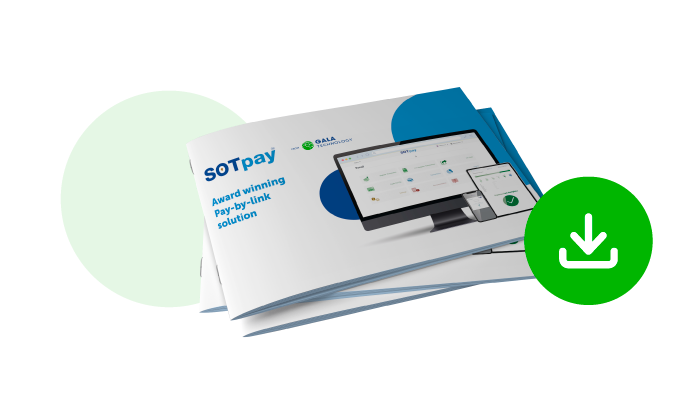
Why Businesses Are Ditching Traditional Bank Transfers for Open Banking
In the fast-moving world of financial technology, Open Banking has emerged as a transformative force. While traditional bank transfers still play a role, they are rapidly becoming outdated for companies that rely on fast, secure, and automated payments.
One of the most common objections we hear when proposing an Open Banking solution is:
“We already use bank transfers—why change?”
It’s a fair question. But for businesses handling high-ticket sales, chasing invoices, or requiring fast turnarounds, Open Banking doesn't just offer an alternative—it offers an upgrade.
Let’s compare the two options and reveal why thousands of UK businesses are making the switch.
The Key Benefits of Open Banking Over Traditional Transfers
1. Speed & Real-Time Settlement
Traditional bank transfers rely on the customer taking the initiative—logging into their bank, inputting your details, and confirming the amount. If the payment is over £1,000, it may be delayed due to approval procedures or fraud checks.
With Open Banking, the payment is initiated by your business. You send a secure payment link via SMS, WhatsApp, Email, Webchat, or even social media, and the customer pays in seconds. It’s real-time. That’s game-changing.
💡 According to the Open Banking Implementation Entity (OBIE), monthly Open Banking payments in the UK surged past 14 million in 2024—a 68% YoY increase. This reflects growing trust and reliance on the system.
2. Improved Payment Completion Rates
Using Open Banking through platforms like SOTpay, you take the friction out of payments. By guiding the customer through the process and removing the need to manually set up payee details, you cut drop-off rates dramatically.
This is especially important in high-value sectors like:
-
Automotive sales
-
Home improvements
-
B2B services
-
Insurance
-
Property letting and management
Faster payments = faster revenue.
3. Automated Reconciliation
Manual reconciliation is a hidden cost for most businesses. Matching bank statements to invoices consumes time and increases the risk of human error.
Open Banking supports automated reconciliation, linking the payment directly to the order reference. This saves your team hours, reduces costly mistakes, and improves cash flow visibility.
4. Enhanced Security and Reduced Fraud
Bank transfers can go wrong—wrong account details, incorrect references, or, worse, falling victim to social engineering fraud.
Open Banking solutions are fully compliant with the latest UK security standards, including Strong Customer Authentication (SCA). Payment details are pre-set and verified—minimising the risk of errors or fraud.
5. Frictionless Recurring Payments
With Open Banking, you can offer clients the option to set up Direct Debit mandates with just a few clicks. This is ideal for subscription-based services, ongoing consultancy fees, or any business model built on regular billing.
It's a win-win: Your clients enjoy flexibility and control, and you enjoy predictable, on-time payments.
Traditional Bank Transfers: The Hidden Inefficiencies
Traditional bank transfers seem simple on the surface—but they come with serious drawbacks:
-
You rely on the customer to initiate the payment (and do it correctly).
-
Payments are often delayed due to approval thresholds or missed banking windows.
-
There’s no payment certainty until you manually check.
-
Reconciliation is a manual process.
-
You can’t prompt or complete a payment while speaking to the client.
In an era where customer experience drives conversions, traditional bank transfers simply don’t cut it anymore.
Real-World Example: Closing Sales Faster
Imagine this: A sales rep is on a call with a client who agrees to buy a £3,000 product. If you're relying on bank transfers, the rep must end the call, send bank details, and wait for the customer to (hopefully) make the payment.
With Open Banking via SOTpay, the rep can send a secure payment request via WhatsApp during the call. The client pays in real-time, and the deal is closed before the phone hits the cradle.
This is why adoption in automotive, legal services, and property sectors has soared. Time kills deals—Open Banking eliminates that time.
Continuous Innovation: Card + Bank Transfer in One Flow
The latest fintech innovation is combining Open Banking with card payment options within the same flow. Gala Technology’s SOTpay+ solution enables customers to choose between card or bank transfer, depending on preference.
This flexibility increases your checkout conversion rate and reduces abandoned carts—especially for e-commerce managers and retailers of high-ticket items.
Ready to Upgrade?
Whether you're chasing late invoices, processing deposits, or closing high-ticket deals, Open Banking gives your business:
-
Speed
-
Security
-
Control
-
Automation
So, is it time to stop relying on outdated systems and start making every interaction a payment opportunity?
Frequently Asked Questions (FAQs)
What is Open Banking?
A regulated financial technology framework allowing businesses to initiate real-time payments directly from the client’s bank account.
How is it better than a standard bank transfer?
Open Banking allows you to send payment requests instantly, reducing delays and removing manual processes.
Can I use both card and bank transfer options?
Yes. Solutions like SOTpay+ allow card and bank payments in a single secure checkout.
Is Open Banking secure?
Yes. It meets all UK and EU regulations including PSD2 and SCA, ensuring robust payment protection.
Does it support recurring payments?
Absolutely. Direct Debits can be set up with a few clicks, supporting recurring billing models.
BOOK DEMO TODAY

















